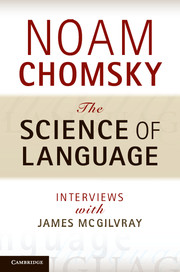Book contents
- Frontmatter
- Contents
- Introduction
- Part I The science of language and mind
- Part II Human nature and its study
- 15 Chomsky on human nature and human understanding
- 16 Human nature and evolution: thoughts on sociobiology and evolutionary psychology
- 17 Human nature again
- 18 Morality and universalization
- 19 Optimism and grounds for it
- 20 Language, agency, common sense, and science
- 21 Philosophers and their roles
- 22 Biophysical limitations on understanding
- 23 Epistemology and biological limits
- 24 Studies of mind and behavior and their limitations
- 25 Linguistics and politics
- Appendices
- Commentaries
- Glossary
- Bibliography
- Index
18 - Morality and universalization
from Part II - Human nature and its study
Published online by Cambridge University Press: 05 June 2012
- Frontmatter
- Contents
- Introduction
- Part I The science of language and mind
- Part II Human nature and its study
- 15 Chomsky on human nature and human understanding
- 16 Human nature and evolution: thoughts on sociobiology and evolutionary psychology
- 17 Human nature again
- 18 Morality and universalization
- 19 Optimism and grounds for it
- 20 Language, agency, common sense, and science
- 21 Philosophers and their roles
- 22 Biophysical limitations on understanding
- 23 Epistemology and biological limits
- 24 Studies of mind and behavior and their limitations
- 25 Linguistics and politics
- Appendices
- Commentaries
- Glossary
- Bibliography
- Index
Summary
JM: You’ve pointed out in your moral/political work that one of the most elemental truths is that you ought to universalize your moral principles. What about people who deny that?
NC: Does anyone actually, literally, deny that?
JM: . . . Not, I suppose, without shifting out of the moral domain.
NC: What people would say, I think, is that yes, we keep to universal principles, but the special circumstances are such that . . .
JM: . . . Wait a minute; the people we’re dealing with are not real people?
NC: . . . No, they are – like Henry Kissinger or somebody. There are people who say that it can’t be universalized. But if you asked Kissinger, who does have the honesty to say it rather than just accept it when it is convenient, he would say that of course, really, at some other level, it is universalized. But it's a deeper principle that is universalized, one that exempts us from the restriction against, say, aggressive war. So the deeper universal principle is, say, that you have to act to make the world the best possible world, but a special case of that is that we have to be exempt from every moral principle. So it's still universalized: immoral, of course, but universalized.[C]
Actually, there's an interesting paper that I don’t understand, but it's interesting. You might want to read it. It's by Akeel Bilgrami. Ask him to send it to you; it's a draft. In it he distinguishes universality from universalizability in a way that is interesting, but I can’t reproduce it, because I don’t quite understand it. It's a paper on Gandhi. He's arguing that Gandhi was in some deep sense an intuitive moral philosopher who had something important to say, and the standard interpretations are wrong. Part of it is a distinction between universality and universalizability. Universalizability means that it's a principle that we have a way to make universal – or something like that. And that's different from a principle that's universal. He does make a distinction, and he has cases that make sense, but I don’t understand it well enough to repeat it. But that might be something relevant; it's an interesting approach. It's a thoughtful paper; I’m sure of that.
- Type
- Chapter
- Information
- The Science of LanguageInterviews with James McGilvray, pp. 113 - 117Publisher: Cambridge University PressPrint publication year: 2012



